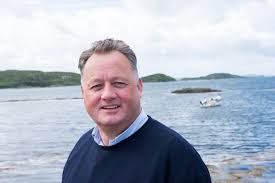SEPA plans ‘will hurt smaller farms’

NEW plans to tighten regulations for Scottish salmon farms will negatively impact smaller operators, a leading producer warns.
The recently published proposals by SEPA (Scottish Environment Protection Agency) aim to strengthen environmental controls over the sector, and usher in a new approach, with larger farms sited in ‘sustainable locations’.
Announcing its recommendations two weeks ago, SEPA said: ‘In practice, we anticipate this will lead to fewer fish farms in shallower, slow-flowing waters and more fish farms in deeper and faster-flowing waters.’
But Alban Denton (pictured), managing director of Loch Duart, said any move to larger, high-energy, offshore operations would negatively impact the company more severely than larger operators in Scotland.
‘Our successful business model is around smaller, gentler, less impactful operations,’ he said. ‘This approach involves establishing well sited farms, stocked at low density and fallowed for longer than regulation periods.
‘We can currently, and historically, demonstrate its effectiveness. Some of our sites have been farmed effectively since 1975.
‘Loch Duart has been virtually lice free for the past two seasons and is one of the best and most consistent performers, from an environmental perspective.
‘The techniques Loch Duart use to achieve this success are much less effective further out to sea.’
Denton said his company was just about the last independent Scottish salmon farming business, maintaining high levels of employment in the most fragile of rural communities.
The SEPA plans would benefit the multinationals at the expense of small, local businesses like Loch Duart, which farms in Sutherland and the Outer Hebrides.
Denton said the company had made a submission to SEPA, which has put its proposals out for public consultation.
‘We are confident that our outstanding record in strong fish welfare and in environmental performance will withstand whatever criteria SEPA are setting to promote offshore sites.’

